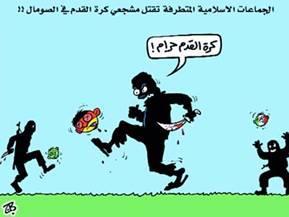 | ||||
|
Following the murder in Somalia of two soccer fans as they watched a televised World Cup game, Jamil Al-Thiyabi, director of the editorial board of the Saudi London-based daily Al-Hayat, penned an op-ed in the paper titled "Soccer is Forbidden!" In it, he stated that these fatwas reflected a crisis in the Islamic world, where the legitimate Islamic institutions do nothing about extremist groups that are forcing their will upon society.
The following are translated excerpts from the article, which was published June 21, 2010:
It Is Extremely Troubling that Extremists Beat, Flog, and Kill Anyone Caught Watching the World Cup
"Does Islam ban entertainment? Is anyone who plays soccer crazy and brainless? Why are people forced... to hide so they can watch soccer games 'secretly' for fear that they will be murdered? Is an extremist gang entitled to impose its 'tutelage' on society and to flog, beat, and murder [people] for watching a soccer game? What is happening in Somalia during the World Cup? Does the Islamic world need more people to accuse others of apostasy and to try to hijack Islam and make it hell because of a piece of leather [i.e. a soccer ball], in accordance with their criminal principles and ways?
"In Somalia, there is a 'fragile,' 'weak,' nearly dead government that controls very limited parts of the capital Mogadishu, [even though] it claims to control [all of] Somalia – while the Islamist groups ban music, soccer, and any form of entertainment.
"In Somalia, the people are living in humiliation and [in danger] of extermination at the hands of extremist groups that cling to the outward manifestations [of Islam] and reject Islam's principles and tolerance...
"It is extremely troubling that an extremist group prohibits watching the World Cup games, and then beats, flogs, and even kills anyone [who does so], on the grounds that these soccer games involve 'crazy men jumping up and down as they chase an inflated object.'
"The best-known modern study that forms the basis for fatwas banning soccer is the 2003 40-page study by 'Abdallah Al-Najadi, which bans playing soccer unless peculiar rules and conditions are met – including the elimination of fouls and penalties, and of red and yellow cards. Al-Najadi's study also included what he called historical soccer facts, on the basis of which he banned the game.[1] These fatwas are attributed to Wahhabism.
"I recall the story of the terrorist caught by the Saudi Interior Ministry in 2003, in a raid on an apartment in the Al-Khalidiya [neighborhood] of Mecca. He was a fellow from Chad or Malaysia, nicknamed 'Abu 'Abdallah Al-Maki,' and his [real] name was 'Abd Al-Hamid Al-Tarawri. Prior to his arrest, when [he was found] booby-trapping Korans and endangering children, he had preached at mosques in Mecca and publicly banned soccer as a Western invention that distracts Muslims from their religion.
"At this time, as the World Cup is going on, there are reports from Somalia that soccer fans are in a great crisis, subjected to a grave threat, after the Islamic movements forcibly prevented them from watching the World Cup games – to the point of killing two of these 'weak' viewers..."
Anti-Soccer Fatwas – An Attempt to Hijack Islam
"In Saudi Arabia, the clerics allowed soccer, provided that [the players'] private parts are not exposed, and that no one is prevented from praying [at the proper time]. Prior to that, [Saudi university lecturer] Sheikh Naser Al-Hanini issued a fatwa permitting people to watch soccer, provided they don't see [the players'] private parts, that it does not prevent anyone from praying [at the proper times], and that it does not cause hatred. But to anyone who asked, he recommended not watching soccer, even if all these conditions were met.
"Two months ago, [Saudi cleric] Dr. Yousef Al-Ahmad issued a fatwa that prohibited sending Muslim children to train at the Spanish Real Madrid Football Club, because it entailed travel to countries of the unbelievers.
"Some Islamic countries have no known fatwas preventing soccer, but a dispute did erupt between Egyptian and Tunisian clerics over players prostrating themselves after shooting a goal. The Tunisian clerics banned this, while the Egyptian clerics permitted it, because it was in order to thank Allah. Some Saudi clerics also banned it, saying that it 'harms Islam.'
"...These fatwas, and the attempt to forcibly hijack the religion in Somalia and other places, prove that the Islamic world is in a crisis that does not end with a ban on soccer or with the extremism of a single group – but that the problem now is much more profound, because there are extremist minds that are trying, in the name of the religion, to destroy the minds of simple folk, 'superficial minds' that are incapable of waking up and thinking when presented with 'booby-trapped' fatwas based on prohibitions, accusation of apostasy, and murder. And the governments and the legitimate Islamic organizations remain silent."
Cartoon in UAE paper: "Extremist Islamist organizations murder soccer fans in Somalia." The extremist says: "Soccer's forbidden!"

Source: Al-Imarat Al-Yawm (UAE), June 21, 2010
[1] See MEMRI Inquiry and Analysis No. 245, "Anti-Soccer Fatwas Led Saudi Soccer Players to Join the Jihad in Iraq," October 7, 2005, http://www.memri.org/report/en/0/0/0/0/0/0/1494.htm.





















